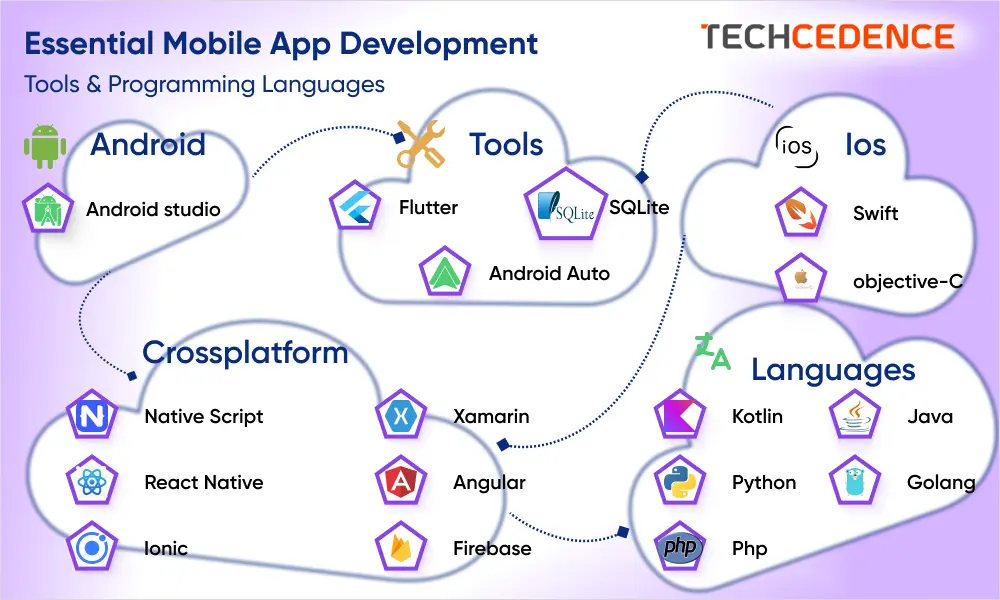
Categories : Mobile App Development
Author : Date : Oct 27, 2022
Per reports, there will be around 7.5 billion mobile phone users by 2025. Besides, about 55 percent of web traffic comes from mobile phones. And, not to forget, with nearly five hours daily spent on mobile phones, every company will require a mobile application to serve its users!
Thus, if you look to achieve success across the digital medium, a mobile is a must! Mobile app development tools and programming languages form an integral part of mobile app development. Here’s a blog that talks about some.
While you have many mobile app development tools, let’s focus on a few famous and the most widely used ones across the technology world.
1. Xamarin
Xamarin is one of the best choices to build native mobile apps. It is a popular app development tool with the trust of over a million developers. Some features of Xamarin that make it as prudent a choice include the following.
2. Appcelerator
Appcelerator is another popular tool on the list. It enables developers to build both native cross-platform apps. It requires fewer lines of coding to develop an app. In addition, it has an open mobile marketplace that allows you to sell or share extensions, modules, and templates. Some features include the following.
3. Android Studio
Android Studio is an open-source mobile app development software. As the name suggests, it can help you create incredible applications on Android. It precisely helps reduce the app development time. Some features that make it an apt tool for building Android mobile applications include the following.
4. Ionic
Ionic offers a complete open-source SDK. Hence, developers use it extensively to build hybrid applications via HTML5, CSS, etc. Ionic allows developers to send the release update to users. Additionally, you can automate app delivery with Ionic with any technical expertise. Let’s look at some of Ionic’s features.
You may leverage many more app development tools like Framework 7, Sencha Touch, Buildfire.js, etc. with mobile app development companies like us.
Now, let’s look at some mobile app programming languages.
1. Python
There’s hardly an entrepreneur, who must not have heard about Python. It is a general-purpose and object-oriented coding language. You can use Python to develop Android mobile applications, although Android does not support native Python development. You can do so through many tools that convert Python apps into Android Packages, which you can run on Android devices.
2. Java
We cannot forget Java when talking about mobile app development programming languages. Java was the first language for Android app development. Google offers extensive support to Java. No wonder, so many applications on Play Store are built with Java. Nevertheless, beginners could find it a bit difficult to work on Java. Thus, ensure you have experts to deal with it.
3. Swift
Swift was introduced as an Apple programming language in 2014. It is an iOS developer’s preferred application programming language. Swift is easier and more concise. It is one reason Swift took over Objective-C. So, if your developers know how to build applications on Objective-C, moving to Swift can be easier.
4. Ruby
Ruby is another object-oriented programming language. Developers trust Ruby for building high-quality web applications with a clean architecture and implementing HTML, JavaScript, and CSS files. It allows easier coding, quick changes, and a secure environment. In addition, it is open source and flexible.
Some other mobile app development programming languages include Kotlin, Rust, C++, C#, and Dart. You may choose the one most suited to your needs.
But how to choose the best mobile app development tool and programming language? Techcedence can answer.
We are a leading mobile app development company with proficiency across various mobile app development tools and programming languages.
While our developers can help create outstanding mobile apps on Android and iOS, our consultants can help you choose the right technology for your needs to augment your RoI. Write to us at sales@techcedence.com.